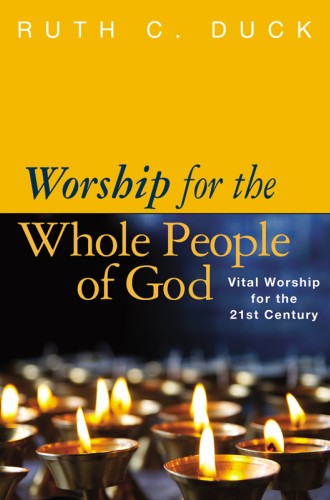Worship for the Whole People of God, by Ruth C. Duck
This is the book I wished for when I taught courses on worship in an ecumenical context. Ruth Duck acknowledges in the introduction that she also struggled “to find readings adequate to the great diversity of denominational and cultural backgrounds of my students”; this is what prompted her to undertake this challenging project.
Well known as a prolific hymn writer and the author of finely crafted worship resources (such as those found in Bread for the Journey, Flames of the Spirit: Resources for Worship, and Touch Holiness: Resources for Worship), Duck is professor of worship at Garrett-Evangelical Theological Seminary in Evanston, Illinois. In that context she regularly teaches students from varying denominations and cultures. Her engagement with these students, visits to their congregations, and ongoing cross-cultural research make this book a unique contribution to worship studies.
Duck is a well-grounded student of Christian liturgical theology and history, both ancient and modern, and especially appreciates the renewal unleashed by the reforms of Vatican II. At the same time, she recognizes the limits of what has passed for a complete account of worship history and practice. She says forthrightly, “The European and White North American measure of what is adequate liturgy must be decentered, so that Christians of many backgrounds can learn from one another and the Spirit how to worship and honor one another more deeply and fully.”





